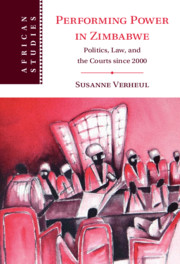Book contents
- Performing Power in Zimbabwe
- African Studies Series
- Performing Power in Zimbabwe
- Copyright page
- Dedication
- Contents
- Figures
- Acknowledgements
- Abbreviations
- Introduction
- 1 History, Authority and the Law in Zimbabwe, 1950–2002
- 2 ‘Rebels’ and ‘Good Boys’
- 3 ‘Zimbabweans Are Foolishly Litigious’
- 4 ‘What Is Abnormal Is Normal’
- 5 Material and Sensory Courtrooms
- 6 The Trials of the ‘Traitor’ in Harare’s Magistrates’ Courts under the Unity Government
- 7 History, Consciousness and Citizenship in Matabeleland
- 8 Historical Narrative and Political Strategy in Bulawayo’s Magistrates’ Courts
- Conclusion
- Bibliography
- Index
- African Studies Series
Conclusion
‘Government Is a Legal Fiction’ – Performing Law, the State, Citizenship and Politics
Published online by Cambridge University Press: 31 August 2021
- Performing Power in Zimbabwe
- African Studies Series
- Performing Power in Zimbabwe
- Copyright page
- Dedication
- Contents
- Figures
- Acknowledgements
- Abbreviations
- Introduction
- 1 History, Authority and the Law in Zimbabwe, 1950–2002
- 2 ‘Rebels’ and ‘Good Boys’
- 3 ‘Zimbabweans Are Foolishly Litigious’
- 4 ‘What Is Abnormal Is Normal’
- 5 Material and Sensory Courtrooms
- 6 The Trials of the ‘Traitor’ in Harare’s Magistrates’ Courts under the Unity Government
- 7 History, Consciousness and Citizenship in Matabeleland
- 8 Historical Narrative and Political Strategy in Bulawayo’s Magistrates’ Courts
- Conclusion
- Bibliography
- Index
- African Studies Series
Summary
The Conclusion argues that by framing political contestations through and over law in Zimbabwe within the binary of repression and resistance, we obscure the diverse and productive ways that the legitimacy of law, and its relation to state authority, were publicly contested after 2000. Instead, it situates the notion of government as a ‘legal fiction’ alongside the arguments made across the book. Three sites of contestation emerged. In the first, the dynamics within state institutions were shown to shape legal consciousness. In the second, the relationship between legal consciousness and particular imaginations of citizenship proved to be fertile ground for the articulation of critiques of the government in ways that remained embedded in expectations and ideals of law. In the third, we saw how the interactions between different actors’ legal and state consciousness within the courtroom produced narratives that articulated contradictory claims to state authority. Taken together, this shows us that, among Zimbabwean citizens and civil servants alike, the law, as both a set of institutions and practices and as a political ideal, continued to be central to expressions of a particular kind of citizenship.
- Type
- Chapter
- Information
- Performing Power in ZimbabwePolitics, Law, and the Courts since 2000, pp. 228 - 237Publisher: Cambridge University PressPrint publication year: 2021

